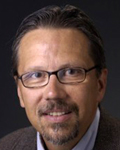The Justice and Peace Studies program now is the Justice and Peace Studies Department. The change became official July 1.
Dr. Gerald Schlabach, who has been the JPST program director for five years and is now chair of the new department, said, "In effect, we had already become a department years ago. It was just time to name it that way. This change represents an affirmation from the university at large − a seal of approval − for the ways we’ve been working in the last few years to build up the program and strengthen our curriculum."
Modifications to the curriculum, he said, mark the "the biggest single change" that the transformation from program to department will have on JPST students: "In addition to the general major, our curriculum now offers three concentrations that focus on career skill sets: conflict transformation, public policy analysis and advocacy, and leadership for social justice. We wanted to give even clearer tracks to students who inevitably ask what they can do with a JPST major."
The new concentrations are the department's way of building upon the program's commitment to integrate theory with practice and are reflected in its new slogan, "Justice and Peace Studies: More Practical Than Ever."
Schlabach said the biggest concern raised by the Dean of the College of Arts and Sciences was whether the program would retain its "interdisciplinary character" through the transition, and he clarified that that will not change: "The JPST curriculum always has drawn from and will continue to draw from many university departments, including Theology (in which the program was based), English, Sociology and Criminal Justice, Communication and Journalism, even the School of Engineering, which has been promoting the concept of 'peace engineering.'"
Now that JPST is an official department, Schlabach believes "we will have greater visibility for students who want to make a difference in the world but who might not have chosen to major in justice and peace studies because they don't consider themselves activists. Now we can make all the clearer that there are ways to work for the common good – the kind of things in the university mission statement – in lots of different professions."







